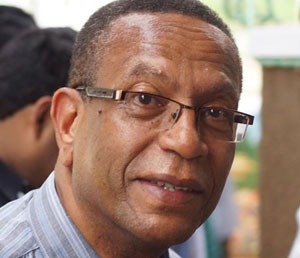 PHILIPSBURG:--- Why even bother at this time to write about the qualifications of a parliamentarian when the next parliamentary election is all the way in 2020? Sadly, this has been the mentality in the past that has led us to vote for persons based, on friendship, family ties, and family tradition, instead of looking at the qualifications, qualities, and experience of the candidates.
PHILIPSBURG:--- Why even bother at this time to write about the qualifications of a parliamentarian when the next parliamentary election is all the way in 2020? Sadly, this has been the mentality in the past that has led us to vote for persons based, on friendship, family ties, and family tradition, instead of looking at the qualifications, qualities, and experience of the candidates.
One of the reasons why we have not paid much attention to the qualifications of parliamentarians is because, during election time, our politicians campaign as if they were running to become ministers in government. However, they failed to point out the difference and the separation between parliament and government. To summarize, the people elect the parliamentarians and the parliamentarians, in turn, appoint the ministers. Therefore, if we want a good Council of Ministers, we must vote for noble, qualified parliamentarians who would ensure that we get a good government.
Besides the four criteria for parliamentarians listed in the constitution, parties, as well as the people, should hold candidates to a high standard. Article 49 of our Constitution states that to “be eligible for membership of Parliament, a person must be a resident of Sint Maarten, a Dutch national, have attained the age of eighteen years and must not have been disqualified from voting”.
As far as the age is concerned, a person can be on a party’s slate at age 17; as long as he/she turns 18 by the time the oath has to be taken.
Based on the Constitution, anyone with the Dutch nationality can become a parliamentarian in Sint Maarten. In this regard, it is interesting to note that the constitutions of neighboring countries like St Kitts and Nevis, the Commonwealth of Dominica and the Territory of Anguilla clearly stipulate that be elected, persons must be connected to the country or territory by birth or descent. If such a criterion were applied in Sint Maarten, many persons would not be eligible to become members of parliament, including me as well as several of our current MPs. Revising the nationality article will require a constitutional amendment, which needs the approval of the other countries of the kingdom.
The criterion “must not have been disqualified from voting” relates to the final verdict of a court of law. In other words, once the court case of a prospective parliamentarian is still in appeal he/she has all rights to join a party or to establish a party. The prospective parliamentarian also has the right to campaign, to be elected, to take the oath of office and to function as a member of parliament until he/she receives the final guilty verdict. This is the reason why MP Silvio Matser is still functioning as a Member of Parliament. Even though the court in the first instance, as well as the joint court of justice, found him guilty of tax evasion, he has appealed the case at the High Court in The Hague and consequently has the right to function as a parliamentarian until he receives the final judgment from the latter court. We may not agree with the law but we must abide by it.
In addition to the constitutional criteria mentioned earlier, it is important that we also evaluate prospective parliamentarians based on several other qualifications such as love for Sint Maarten, Dutch language skills and integrity. If persons have a love for Sint Maarten, it will show in their involvement in the community. They will be engaged, in one way or another, in trying to better the society. Their motive for getting in politics would be for the sake and the good of the people and not for personal gain. They should ascribe to, and live by, the principles of integrity, transparency, accountability, and love for the country. How many of the 125 candidates who took part in the 2016 elections are still visible and active today? Even many of them, who have been elected to parliament, often do not see the need to represent us as we expect them to. One parliamentarian has not attended parliamentary meetings in months. At times, several of our parliamentarians have refused to attend meetings. Not too long ago, the minority faction in parliament even declined to represent us at a high-level kingdom meeting. This is really not the kind of representation that we expect from our parliamentarians!
As far as Dutch language skills are concerned, it is important that prospective parliamentarians have at least a working knowledge of the Dutch language. It is interesting to note that the Constitution of the Commonwealth of Dominica includes a language qualification stating that to be qualified to be elected a person must be able to speak and read the English language. Admittedly, Sint Maarten’s constitutional and judicial systems are very much embedded in the Dutch system. It is obvious that Dutch supersedes the English language when we read the disclaimer at the bottom of each page of a translated law: “No rights can be derived from the English translation”.
The SMCP believes that if voters take the additional qualifications into serious consideration when electing parliamentarians, Sint Maarten would have a stronger, better qualified, integrity-based parliament, which in turn would appoint ministers to the Council of Minister, based on their professional, experiential and ethical qualifications.
Wycliffe Smith
Leader of the Sint Maarten Christian Party









